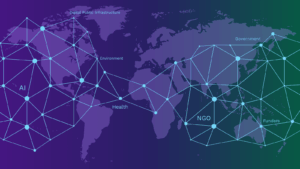As the United Nations (UN) looks to accelerate progress towards meeting the Sustainable Development Goals (SDGs), it’s no surprise that data governance has jumped onto their agenda. Data can serve as a core resource for action to meet the SDG targets, yet unfortunately, little data is being leveraged to pave the way for meeting the ambition of the Agenda 2030 on Sustainable Development.
This blog summarizes some key insights from the discussion on March 28, 2023, at the United Nations Commission on Science and Technology for Development (CSTD). This subsidiary body of the Economic and Social Council serves as a UN focal point for science, technology and innovation for development. At its 26th session, Austria, India and Switzerland organized a session on data protection and data empowerment.
The session introduced emerging concepts including “data spaces” and “data commons” and unpacked some of the initiatives, nationally and regionally, shifting the discourse on data. The discussion demonstrated that while there are many good practices leveraging data with a view to achieving the SDGs, fresh approaches are needed to responsibly unlock the value of data for all and balance data protection with the empowerment of individuals and communities to leverage data for the common good.
“We need to get some balance right here between free flow of data, but also protecting and empowering people not just to be protected but actively and freely use their data in a way that can benefit their lives.” Thomas Schneider, Head of international affairs, Federal Office of Communication (OFCOM), Switzerland.
Speaker contributions touched on how to find innovative ways to govern the availability, usability, and integrity of data and the general principles and norms on data governance that could boost the achievement of the Agenda 2030, nationally, regionally and globally.
“Big questions of our time which do not stop at national borders can be answered by data” Mattias C. Ketterman, Head of the research programme “Regulatory Structures and the Emergence of Rules in Online Spaces” at the Leibniz Institute for Media Research, Hans-Bredow-Institut.
In the past, data protection has arguably focused too much on individuals and individual interests, leaving out the value of connecting data. Speakers suggested fresh approaches to data governance considering the ways in which privately held data can be accessed by governments and how governments can ensure that publicly held data is better connected across national ministries to avoid silos.
“How do we ensure that all stakeholders from all parts of the world are properly reflected in discussions?” Torbjörn Frederikson, Head, E-commerce and Digital Economy Branch, UNCTAD.
At the same time, huge digital divides and data poverty exists. This is impacting how countries can leverage data to meet the SDGs. While global digital platforms are well-positioned to connect different types of data, put these sources together and create digital intelligence that can be monetized, other actors fall behind and are unable to harness opportunities.
The discussion highlighted the need to facilitate inclusive data governance and strengthen developing countries’ participation in policy positioning. Unfortunately, many countries are localizing data without understanding fully the impact or fragmentation this can have on global and national markets. There is a significant risk that existing divides will widen even further if there is not a multi-dimensional discussion on how data can be used.
“It is essential to work together so that data governance is driven by digital inclusion and multistakeholder engagement”, Marielza Oliveira, Director for Partnerships and Operational Programme Monitoring Communications and Information, UNESCO.
Affirming the need to address divides, speakers underscored that data governance is also a matter of digital inclusion. Digital inclusion as a wider concept is now becoming a question of how people’s data is used and included. The concept of openness is also closely related if individuals and organizations can solve complex data governance problems collaboratively. For the United Nations Educational, Scientific and Cultural Organization (UNESCO) openness is a key pillar to digital cooperation, but needs “guardrails”. This is explored in the UNESCO open data guidelines where member states are looking at how to use open data for good.
“Data-sharing is both a political and technical question” Clara Neppel, Senior Director, IEEE.
However, data’s technical and infrastructure needs are not to be overlooked. Noting the political issues around data, speakers affirmed the need for fair democratic processes to set up the social contract on how data is used and managed. On the policy level, this requires a multidimensional and multistakeholder approach. On the technical level, there are many dimensions around interoperability, retrievability of data, and implementing privacy. Social technical standards and how to implement accuracy and accountability remain very important and should be facilitated by bottom-up requirements. For data governance standards to work it is essential that top-down and bottom-up approaches come together.
“If the mission and the positive vision of a data century and society is to responsibly unlock the value of data for all then how do we do that?” Bertrand De La Chapelle Chief Vision Officer, Datasphere Initiative.
Many interventions touched on the point that a lot of emphasis in discussion around data is put on personal data and privacy. Non-personal data itself can also be the source of enormous value creation. Policy conversations on data can also be captured around the monetization of data, often forgetting the societal impact and benefits of data-sharing and use.
However, speakers pointed out that harnessing economic and social value creation requires data to be more accessible and our use of it should be more responsible. There is a need to balance approaches that pose too many restrictions, preventing the creation of value and the other extreme of not enough protections that lead to challenges and harms.
The Datasphere Initiative shared ideas towards a protocol approach to responsible data-sharing to help address some of these challenges. This could not only provide a technical support layer for data-sharing but assist data communities who want to share data among themselves with charters. This may further interoperability and address some of the challenges around the interface between technical and policy layers.
The session closed by outlining a couple of the fora where governments and the United Nations are addressing data policy and participants highlighted a need for more multistakeholder exchange and engagement. The UN Digital Global Compact, Summit of the Future and UNCTAD e-Week were noted as examples of opportunities to build on the exchange where stakeholders can contribute to the discussions.
- Video recordings of the Commission on Science and Technology for Development – twenty-sixth session can be found here




